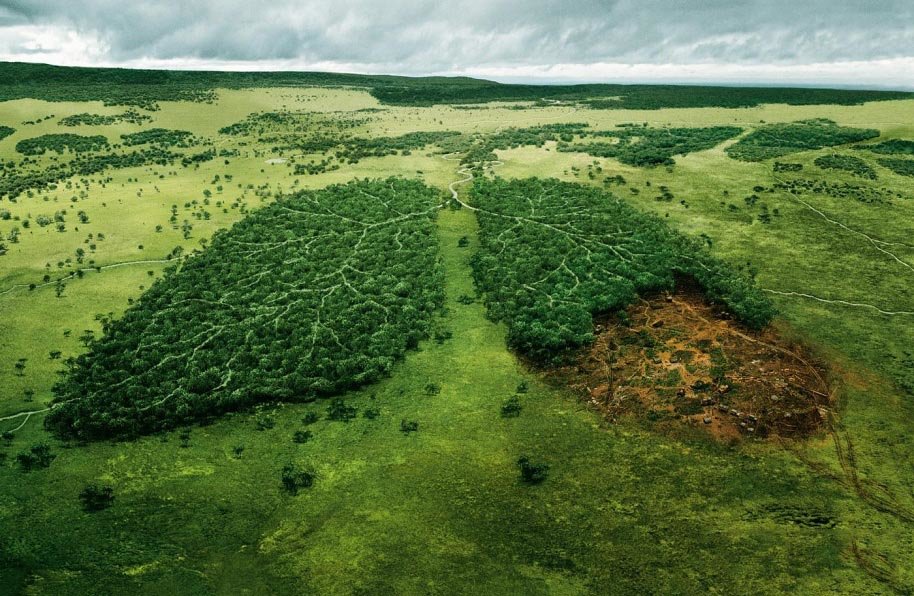How come we are treating trees like intruders?

They say trees are lungs of the Earth, so how come we are treating them like intruders?
Over 400 million years ago land plants began to diversify on Earth. However, according to Universe Today our ancestors have been around on Erath for about six million years and the modern form of humans only evolved about 200,000 years ago. Civilization as we know is only about 6,000 years old, and industrialization started in the earnest only in the 1800s.
Now who is the intruder? Trees have always been generously around and transforming carbon dioxide into the clean, pure oxygen we need to breathe.
According to the Arbor Day Foundation, one mature leafy tree produces enough oxygen for 10 people every year and it is very important to realize that a tree’s health is one of the key factors in its ability to produce oxygen; essentially keeping our trees healthy keeps us healthy.
Additionally trees help cleanse the air of harmful pollutants such as carbon monoxide, sulfur dioxide, and nitrogen dioxide. This is important because numerous studies have shown that exposure to pollutants can cause a variety of health problems including irregular heartbeats, heart attacks, asthma, decrease lung function and other respiratory ailments.
Relatively speaking over our short-term presence on Earth we have seriously harmed trees and take advantage of them to accelerate development.
We have simply cut down trees to build roads and settlements because they were on our way. Overgrazing, land clearance for agriculture, illegal and legal logging activities are other instances of human inferences with the once-pristine nature.
Wildfires, in most cases started by human beings, either intentionally or unintentionally are also speeding deforestation.
Global forest loss
As per a UN report published by the Guardian in September 2015 the rate at which the world is losing its forests has been halved, but an area of woodland covering some 129m hectares- the size of South Africa -has been lost since 1990.
In 1990 the world had 4,128 million hectares of forest covering 31.6% of the global land area, the report said, however, by 2015 this had decreased to 3,999 million hectares, covering 30.6% – a net loss of some 129 million hectares. The biggest loss of forests happened in the tropics, particularly in South America and Africa.
According to Global Forest Watch (GFW) countries with greatest tree cover loss (2001-2016) are Russia, Brazil, Canada, U.S., Indonesia, Congo, China, Malaysia, Argentina, and Paraguay.
Losing 49.5 million hectares of forest area in 15 years Russia tops the list.
GFW is an open-source web application to monitor global forests in near real-time. GFW is an initiative of the World Resources Institute (WRI), with partners including Google, USAID, the University of Maryland (UMD), Esri, and many other academic, non-profit, public, and private organizations.
What’s going on in Iran?
Some 11 million hectares of Iran’s land area constituting to about 7 percent of the country is covered with forests.
For one Hyrcanian forest, one of the most ancient forest worldwide, which has granted the areas with unique richness of biological diversity, its endemic and endangered species, and its natural beauty, used to stretch over 2.3 million hectares of land in northern Iran while they have shrunk to 1.18 million hectares in the past 25-30 years.
According to an infographic by IRNA news agency some 15,000 hectares of forest burn in wildfires annually. Moreover, over 797 million saplings are destroyed to feed the livestock.
We are letting forests to disappear
Forest are home to 80% of the world’s terrestrial biodiversity, and they also form the source of livelihood for many different human settlements, including 60 million indigenous people, a report by World Wildlife Fund said.
Forests provide us with food and air we breathe. They provide habitats for animals, prevent soil erosion, and mitigate climate change, yet despite the fact that we crucially depend on the forest we are letting them to disappear.
Wherever we live we should collectively attempt to build a future where we live in harmony with nature; trees, rivers, oceans, etc. have been living here long before us. They are the open-handed landlords and it’s unfair to be ungrateful to them.
MQ/MG
Leave a Comment